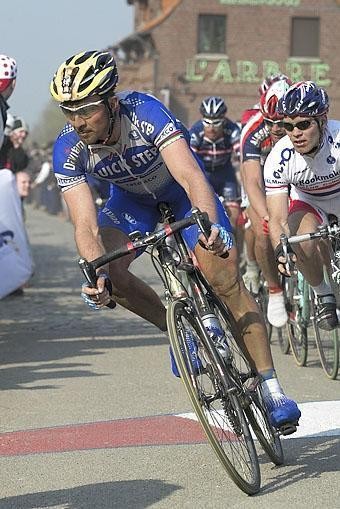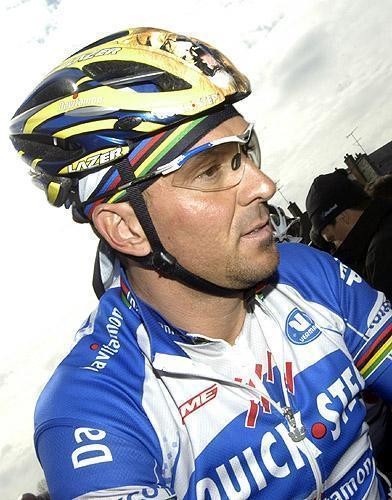The Lion's last roar: Part I
Today at the Scheldeprijs Vlaanderen, the cycling world will hear the final roar from the Lion of...


Tales from the peloton, April 15, 2004
A tribute to cycling legend Johan Museeuw
Today at the Scheldeprijs Vlaanderen, the cycling world will hear the final roar from the Lion of Flanders as classics legend Johan Museeuw turns his pedals in anger for the last time as a professional. In Part I of this special Cyclingnews feature, Anthony Tan takes a look back on the most celebrated and respected classics rider of our generation, whose career began over sixteen years ago, way back in 1988.
Despite 101 victories spanning his sixteen and a half year career, Johan Museeuw said he never thought he would turn professional until the day it actually happened. "I was never certain that I would make it until it was a fact," he said modestly in an interview a few years ago.
"Eddy Planckaert and Fons De Wolf thought I had talent, and during my first year as a professional [with ADR in 1988], I was able to show myself and take some good results. Then after Paris-Tours [Museeuw finished third in 1989], I had the feeling I would make it - but I never believed I would achieve such a palmarès."
Though even the most confident or talented of riders wouldn't have forecasted such success. Museeuw's podium place in Paris-Tours, coupled with another trio of thirds in the Tour of Belgium, Dwars door Belgium and the Grand Prix Eddy Merckx was certainly promising, but it was his subsequent years at Lotto which saw the emergence of the greatest classics rider of our generation, and the man we know as the Lion of Flanders.
His first one-day victory with Lotto, the 1991 Meisterschaft Von Zürich, where he beat French cycling legend Laurent Jalabert and Max Sciandri at just 24 years old, was significant. But it was his second place at the Ronde van Vlaanderen behind fellow Belgian Edwig Van Hooydonck that same year - a race that he would go on to win three times, in 1993, 1995 and 1998 - that was even more impressive and carries greater importance, for the Ronde has invariably been a race for the experienced and crafty. However, back then, young Johan was unafraid of the parcours, race conditions, or even his more experienced rivals... the same way he has always been.
Get The Leadout Newsletter
The latest race content, interviews, features, reviews and expert buying guides, direct to your inbox!
Asked if he has ever been intimidated or scared of anyone in the peloton, he replied, "I am frightened of nobody. Because a rider who is frightened already loses ten percent of his capacities." Museeuw said he would rather let others be frightened of him (of which there are many), because if those riders have already lost ten percent of their capabilities before the race has even begun, it makes him feel even stronger.
On first appearance, the man from Gistel in West Flanders doesn't appear the type to engage and thrive on this sort of psychological warfare, although he is considered to be a quiet and introverted man. Which is something he denies: "Look, the media plays a large role in this - I always get that label of being quiet and reserved, but that is not so," he said. "But you get this [being labelled] in every sport. It makes for a good story."
Another misconception is that Johan Museeuw and the Tour de France are exact opposites. The fact is, Museeuw rode his first Tour in only his third year as a professional and achieved instant success in his initial foray into France. Fired up after his first victory on the fourth stage from Nantes to Mont-Saint-Michel in 1990, the then 23 year-old catapulted himself into the big time by triumphing on the queen stage to Paris, hitting his straps at the perfect moment to beat Adriano Baffi and eventual points winner Olaf Ludwig.
While his victory on the Champs Elysées was to be Museeuw's last, he earned the honour of wearing the maillot jaune on five occasions and the maillot vert on another fifteen, finishing second in the points competition to Laurent Jalabert and mad-as-a-hatter-sprinter Djamolodin Abduzhaparov at the '92 and '93 Tours respectively. But it was early success that later proved to be his Achilles' heel at Le Tour, the frustration resulting from his slew of second and third placings almost prematurely ending his career. "I had some beautiful moments but also a lot of difficult ones, especially in the years where I strived to obtain wins but never succeeded," he remembers.
After doing the double in 1990, Museeuw was being labelled as a pure sprinter and a man who would succeed Ludwig and challenge Abduzhaparov and Jalabert for the maillot vert. However, in the following five editions, while the "Tashkent Terror" Abduzhaparov and Jalabert went on to achieve great success, sharing five green jerseys and numerous stages between them, it left Museeuw empty-handed and seemingly empty-headed. In 1995, despite winning the his second Ronde, the Meisterschaft Von Zürich and the Four Days of Dunkirk, rumours of retirement spread like wildfire among the press - most hoping it wasn't true.
Museeuw went on to ride eleven Tours de France, his last in 2001 after a four-year hiatus (read his Tour de France diary), but intelligently switched his focus from summer to spring after his outings at the Tour bore little fruit. He said at the time: "After 11 years as a professional, I want to choose the races in which I want to go really deep. I can afford to put the bike aside but still love the job, the taste of victory, the team, the atmosphere too much."
The subtle yet significant change brought about arguably his most successful as a rider with no less than seven victories in 1996, highlighted by wins in Paris-Roubaix, the Belgian road championship, overall victory in the World Cup, and the possibly the sweetest of them all, the world road championship held in Lugano, Switzerland.
Still today, after another two victories in Roubaix and one more in the Ronde to make it three apiece, the softly spoken man of steel regards his triumph at the World's to be the most special. "I say this with great difficulty, but if I had to choose, it would be my world championship win. To be world champion was always a huge dream of mine, and the win was especially satisfying because I thought it would never come. But my first win in Flanders was superb... not that the other two weren't fantastic, but my first win in the Ronde still holds a special feeling."
Looking at his palmarès post-1996, it was a good thing Museeuw didn't hang up his wheels early. Besides, he would have missed the pain - this insatiable appetite for suffering is something he said he will continue to feel nostalgic about and attempt to find in other forms following his retirement. "I will still experience [pain] but in a different way, now that I will be an ordinary person."
Though it hasn't all been smooth sailing: Museeuw has endured two life threatening events as well as a drugs scandal since his win in Lugano. The first occured at the '98 Paris-Roubaix (see breakout box); the second just over two years later after he was knocked off his Harley Davidson along with his wife and his son, which saw him comatosed for almost three weeks. More recently, the recent drugs affair involving veterinarian Jose Landuyt affected the Lion of Flanders deeply, who was one of the first riders questioned in early September last year. However, Museeuw has maintained his innocence and non-involvement, always saying that he would retire in a manner of his own choosing, and has stayed true to his word. He has previously said: "Fate won't decide when Museeuw will stop, only Museeuw will."
While it would have been fitting for Johan to win the Ronde or Roubaix for a fourth time - or even Milan-San Remo, a race he has said he would have liked to have won at least once - Museeuw in his last years has often selflessly ridden at the service of others, as well as providing advice when appropriate to the likes of Tom Boonen or Michael Rogers, even Paolo Bettini on occasion. Museeuw has always maintained one is never too young to learn: "I've always tried to listen as much as possible to other people," he said.
"If someone provides me with advice on a certain way of training, then I will try that and see what impact that has on me. Do I go better? Or worse? Also, with regards to diet, I listen to a number of people and adjust my dietary habits accordingly. I may have been a professional for more than 15 years but I can still learn."
With his willingness to learn and desire to impart knowledge onto those who listen, it's no surprise the now 38 year-old (he'll be 39 in October) will continue to stay in cycling; he already has a position as a Quick.Step team director, debuting in the Tour of Belgium this year alongside his long-time directeur-sportif, Patrick Lefèvre. However, as reported recently on Cyclingnews, Museeuw's ambitions stretch further still: "I dream one day of becoming the national coach," he told the Belgian RUG papers.
"Don't get me wrong, [current coach] José De Cauwer is very valuable, but I am prepared to take my turn. I would do it with the same motivation I had as a rider." Naturally, Belgian Cycling Federation president Laurent De Backer can't wait: "It is a complete honour when such a champion offers himself. Museeuw is an experienced expert. I hold him in very high regard as a man and as a rider. With his name, he can bring a lot to cycling in our country," he said.
Whatever the outcome, one thing is certain: Johan Museeuw will depart the peloton a champion.
Part II: How the peloton will remember Johan Museeuw.